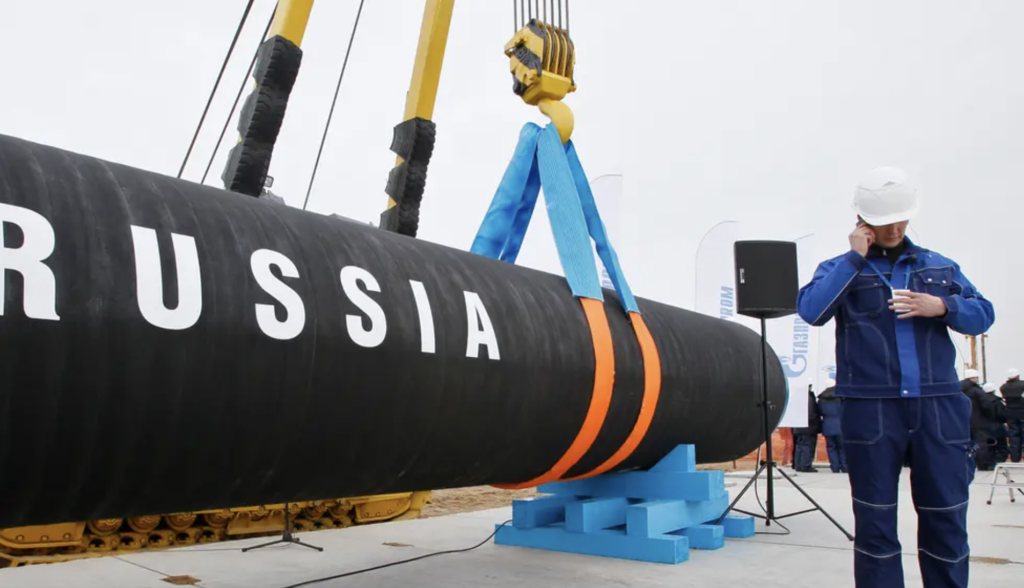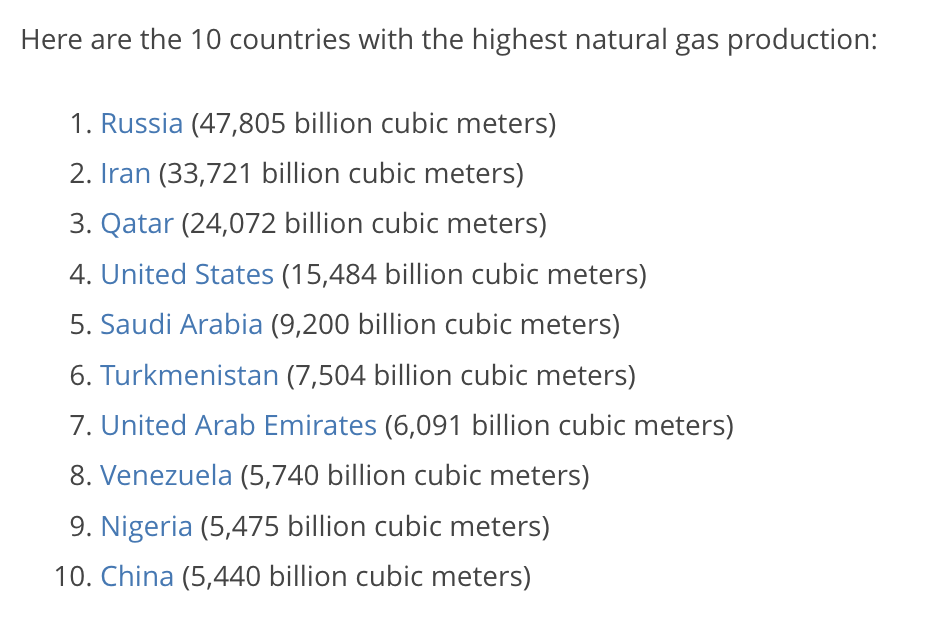Aside from historic tensions between Russia and NATO-member countries, there’s another factor that appears to be driving some of the conflict over Ukraine. Russia is the world’s largest supplier of natural gas, providing about 40% of Europe’s supply. Russia might be able to manipulate the supply chain, including cutting off gas pipelines running through Ukraine.


Most of the natural gas used in Europe heats homes, and there’s a large part of it powering industry in the continent. Russia’s biggest customer has been Germany, which needs natural gas to heat homes and run factories. While German has invested heavily in wind power and other renewables, natural gas still leads the way.
That was behind German Chancellor Olaf Scholz visiting President Joe Biden at the White House this week. The main topic of discussion was a Russia-to-Germany pipeline called Nord Stream 2. While it’s not yet in operation, it’s been the source of NATO-member debate for years, with Germany supporting the pipeline but the U.S. has been worried that it would increase Europe’s dependence on more Russian energy.
It would be highly disruptive if Russia decides to cutoff natural gas to Europe — unlikely as much or Russia’s economy is energy dependent. But it could be used if military and economic tensions between Russians the U.S. continue to escalate. The game of chess continues as Russia prepares its large combat force to go to war, if necessary, and the U.S. struggles to build more NATA support for a potential armed conflict.
Russia could cut off gas exports via pipelines in Ukraine — which would have a harmful impact on Germany and Europe overall. That’s been a driver for Germany to send it chancellor over to Washington to meet with Biden. There’s also a concern from Germany and others that Europe’s already high energy prices could soar if Russia were to alter the supply.
Ford taking electric trucks and commercial vans seriously
Ford is adding to the electric truck market through its F-Series — and more recently from an announcement it will begin shipping its all-new E-Transit electric commercial vans. Ford invested $100 million in Kansas City Assembly Plant and added approximately 150 full-time jobs to produce E-Transit as part of its commitment to American manufacturing. This vehicle follows the Mustang Mach-E sport utility vehicle, the F-150 lightning electric pickup, and the F-150 Lightning Pro, the first-ever all-electric F-Series truck purpose-built for commercial customers.
The company said it will be able to globally produce 600,000 battery electric vehicles by late 2023. The E-Transit already has more than 10,000 orders from businesses of all sizes and Ford is working on ways to increase production, the company said.
Ford is also selling another potential benefit to customers going the electric truck route. The company said it will be the first in the U.S. to offer the ability for customers to power their homes with the F-150 Lightning if the grid were to go dark. Ford and its F-Series until will be partnering with major solar company Sunrun to enhance home energy management. That comes soon after the nation saw its largest-ever energy interruptions during 2020.
BMW Brilliance being led by the German automaker
BMW AG has an increased majority stake in its Chinese joint venture BMW Brilliance Automotive Ltd. (BBA). BBA just received the necessary business license from Chinese authorities, effective Feb. 11. It’s giving the German automaker a 75% stake and Chinese partner Brilliance China Automotive Holdings Ltd. is indirectly holding the remaining 25%.
The BMW Group in 2020 worked with its Chinese partner on doubling battery production at the Tiexi, China, battery factory. That was done to increase supply coming from growing demand for its electric vehicles in that market.
These ownership changes have been in the works since 2018, when Tesla was given an exemption and kept full ownership of its Chinese operations. BMW first took a majority share in BMW Brilliance that year. But as of the beginning of this year, the Chinese government has stopped making the 50-50 mandate.
The government is taking a more cautious approach in other sectors as that ownership model continues to change across economic sectors. Much of that comes from its ridesharing giant Didi Global Inc’s controversial listing. Didi held an IPO in June last year, which placed pressure on Chinese companies doing business in the U.S. Filing with the U.S. Securities and Exchange Commission didn’t go well with Chinese authorities. China’s antitrust regulator, the State Administration of Market Regulators, ended up grilling leading Chinese tech companies last year, including Didi, about unfair competitive practices.
Shenzen, China-based BYD had a very good month — and year. Its EV sales totaled 92,926 and soared 367.6% of sales in January 2022 over that same month a year earlier. That followed a year of selling about 600,000 vehicles last year. Last fall, Warren Buffet’s Berkshire Hathaway was able to lead the raising of about $1.78 billion in stock placement on the Hong Kong Stock Exchange.
And in other news………
Trucker battle in Canada: Auto parts maker Magna International Inc said disruptions at the Ambassador bridge caused by Canadian trucker protests against Covid-19 vaccination mandates have started to have some initial impact on its operations. Since late January, convoys of truck drivers going from British Columbia to Ottawa have been blocking traffic to protest Prime Minister Justin Trudeau’s mandate. Some of Magna’s automaker customers have had to cut or idle production due to the gridlock at the Canadian capital; the route has always been a key supply route for U.S. automakers.
Funding strong for EV charging and vehicles: The Biden administration yesterday announced $5 billion will be available to states to fund electric vehicle charging stations over the next five years. It came out of the administration’s $7.5 billion in infrastructure funds tied to expanding the nation’s network of EV chargers. It’s a very good time for the charging infrastructure and EV makers to gain necessary financial backing. It topped $19 billion last year, according to Crunchbase data — more than double what came through in 2020. Electric truck maker did well, raising $2.65 billion in January 2021 and another $2.5 billion in July of that year. The solid-state battery space is finding backers too for battery companies and OEMs.
Tesla is going through a bit of turbulence for a few reasons…….
—A California civil rights agency sued Tesla this week, alleging racist harassment of and discrimination against black workers that has persisted for years at the company’s car assembly plant and other facilities in the state. That was tied into a three-year long investigation and review of hundreds of complaints from Tesla workers by California’s Department of Fair Employment and Housing.
—Tesla will be recalling nearly 580,000 vehicles in the U.S. — coming from 10 recalls with two of them in the past couple of weeks as increasing scrutiny has come from the National Highway Traffic Safety Administration (NHTSA). One of the most recent recalls ordered Tesla to roll back a self-driving feature that caused the company’s cars to break the law. While Elon Musk said “there were no safety issues,” federal regulators disagree. Teslas has attempted to slow down but not completely stop at all-way intersections with stop signs, under very specific conditions. The company first introduced the so-called “rolling stop” feature back in October 2020 as part of an update to its Full Self-Driving beta software update.



